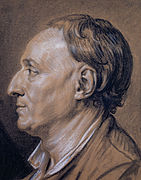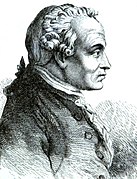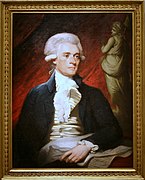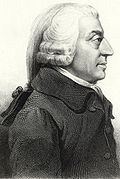|
Vikidia currently has 4,625 articles. Improve it! |
|
Join Vikidia: create your account now and improve it! |
Age of Enlightenment
The Age of Enlightenment was an 18th century cultural movement in Europe. It was most popular in France, where its leaders included philosophers like Voltaire and Denis Diderot. Diderot helped spread the Enlightenment's ideas by writing the Encyclopédie, the first big encyclopedia. The Enlightenment grew partly out of the earlier scientific revolution and the ideas of René Descartes.
Enlightenment ideas[edit | edit source]
The Enlightenment's most important idea was that all people can reason and think for themselves. Because of this, people should not automatically believe what an authority says. People do not even have to believe what churches teach or what priests say. This was a very new idea at the time.

Another important idea was that a society is best when everyone works together to create it. Even people with very little power or money should have the same rights as the rich and powerful to help create the society they live in.[1] The nobility should not have special rights or privileges any more.
These were very new ideas at the time. They were also dangerous thoughts for the people in power. Many Enlightenment philosophers were put in prison or were forced to leave their home countries.
Effects[edit | edit source]
Many of the Founding Fathers of the United States believed the Enlightenment's ideas. For example, the idea that a government's job is to benefit all of a country's people - not just the people in power - was very important to them. They made this idea about a government "for the people" one of the most important parts of the new United States Constitution and the new American government they created.
The Enlightenment's ideas were also important to the people who fought in the French Revolution of 1789.
In some countries, kings and queens took some of the Enlightenment's ideas and made changes to their governments. However, they still kept power for themselves. These kings and queens were called "enlightened despots." Examples include Catherine II of Russia (Catherine the Great), Frederick II of Prussia, and Gustav III of Sweden.
During the Age of Enlightenment, as more and more people began to use reason, some began to disagree with the idea that God created the world. This caused conflicts - and, later, war.
Many ideas that are important today were created during the Enlightenment. Examples of these ideas include:
- Freedom, democracy, and reason should be the most important things in a society.
- Everybody in a society should have the same rights. Every government should have a contract which promises that people will have these rights.
- People should solve problems with rationalism and the scientific method, instead of looking for answers from religion
- Writers and philosophers should be free to look for the truth, even if they disagreed with the ideas of people in power such as aristocracy.
- Nobody should have to follow a certain religion. There should be freedom of religion, and people should accept others who follow different religions.
The Enlightenment's ideas about thinking with reason, having personal freedoms, and not having to follow the Catholic Church were important in creating capitalism and socialism.
Important Enlightenment figures[edit | edit source]
Important people in the Enlightenment came from many different countries and shared ideas in many different ways. Some of the best-known Enlightenment figures, organized by home country, are:
English[edit | edit source]
- John Locke (1632-1704): An English philosopher known as the Father of Modern Empiricism and the Father of Liberalism. His ideas were very important to Thomas Jefferson and The Founding Fathers when they wrote the United States Declaration of Independence. Locke's ideas about people's rights to "life, liberty, and the pursuit of happiness" were especially important, and appear in the Declaration of Independence.
- Thomas Paine (1737–1809): A writer, Deist, radical republican, and polemicist. He is most famous for writing a pamphlet called Common Sense, which said that England should not be allowed to control the colonies in America. Paine also wrote The Age of Reason, a criticism of the Bible, and The Rights of Man, which defended the French Revolution.
French[edit | edit source]
- Voltaire (born François-Marie Arouet) (1694-1778): A philosopher, writer, playwright, and Deist. He argued with the Catholic Church and the French government. Because of this, he was put in prison and exiled from France. He wrote many different books about philosophy, plays, and histories. His ideas were important in the French Revolution. Many people considered the 18th century to be le siècle de Voltaire (the "Century of Voltaire").
- Jean-Jacques Rousseau (1712-1778): A Swiss-born French philosopher, writer, and teacher. His criticisms of the French State were some of the most powerful of his time. In his book Emile, or On Education, he wrote about many of his opinions on education.
- Montesquieu (1689-1755): A political thinker. He is famous his writings about the separation of powers. Today, this idea is very common and is a part of many constitutions all over the world.
- Denis Diderot (1713–1784): He wrote the Encyclopédie, which included 28 different books. In these books, he wrote about all different kinds of learning.
American[edit | edit source]
- Thomas Jefferson (1743-1826): A statesman, political philosopher, and Deist. He was a Patriot, fighting against England, during the American Revolution. He helped write the United States Declaration of Independence (1776) and the United States Constitution (1787).
- Benjamin Franklin (1706-1790): A statesman, author, scientist, and poet. He was also a Patriot during the American Revolution and helped write the Declaration of Independence and the Constitution. Franklin was the first person to understand lightning, and worked as a civil servant in Philadelphia.
German[edit | edit source]
- Immanuel Kant (1724-1804): A Prussian (German) philosopher, writer, and physicist. He was one of the most important people of the German Enlightenment. Between 1781 and 1790, Kant wrote three important books in the history of philosophy: Critique of Pure Reason, Critique of Practical Reason, and Critique of Judgement.
- Gottfried Leibniz (1646-1716): A philosopher and mathematician who created calculus. He was another leader of the German Enlightenment.
- Christian Wolff (1679–1754): A philosopher who continued Leibniz's work.
Scottish[edit | edit source]
- David Hume (1711–1776): A Scottish historian, philosopher, and economist. His ideas were important to Immanuel Kant and Adam Smith.
- Adam Smith (1723–1790): An economist and philosopher. He wrote The Wealth of Nations. In this famous book, he argued that wealth was not money; instead, it came from capital and labour. He is sometimes thought to have created the laissez-faire economic theory. His books brought many changes to the Western world.
Swedish[edit | edit source]
- Emanuel Swedenborg (1688–1772): A natural philosopher and theologian who tried to figure out how the soul worked in the body.
David Hume (1711-1776)
Alessandro Volta (1745-1827)
Thomas Jefferson (1743-1826)
References[edit | edit source]
- ↑ Brown, Stuart (2012). British Philosophy and the Age of Enlightenment. Routledge. ISBN 1135865116, 9781135865115. http://books.google.co.uk/books?id=couCj7D1Vz0C&pg=PT335&dq=age+of+enlightenment+cooperation&hl=en&sa=X&ei=TPalUqPOI4Go0AWvgoGIDw&ved=0CD4Q6AEwAg#v=onepage&q=age%20of%20enlightenment%20cooperation&f=false. Retrieved 9 December 2013.









